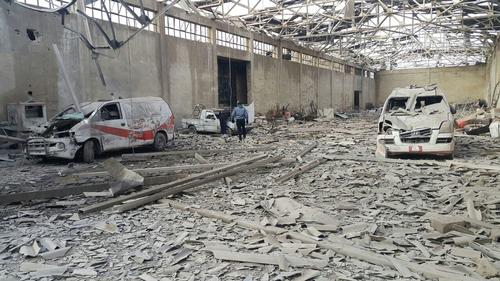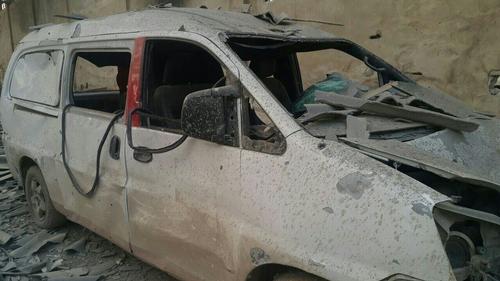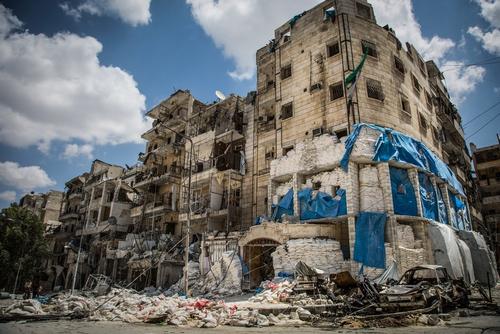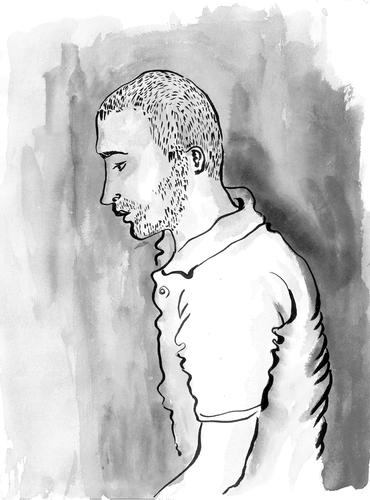Al-Marj clinic is one of the most important MSF-supported medical sites in east Ghouta, an area of besieged towns near Damascus, Syria. After suffering a series of tragedies, Dr Abu Yasser*, a GP and director of the medical department of the clinic, describes the newest challenge: no more ambulances.
Yesterday [Monday 5 December], a strike hit near our clinic and destroyed our two ambulances and two other hospital cars. This is terrible because now we are worried about what we’ll do if injured come in and we can’t refer them elsewhere.
Marj is geographically quite isolated. Its people are farmers. What they sow they eat, and poverty is a major issue. This area has been neglected by most medical and humanitarian aid, so when international aid convoys are permitted into eastern Ghouta, Marj is usually excluded.
Every minute counts
For major emergencies, we would refer patients 12 to 15 kilometres away to a medical facility that can handle such cases. Now, with no more ambulances, we are concerned if major injuries come in, because every minute counts and there is much danger if patients are not transported in a careful and correct manner. We really need ambulances, and we’ve been reaching out to local organisations in the hopes they can help us get one.
Blast holes in the walls and ceiling
I have been working in the Marj clinic since the war began. A committee of doctors was formed to cover around 23 municipalities in the area. At first we were working in a government hospital, but the authorities decided to leave and pull out the staff. Eventually, we set up our current clinic, which continues to function. This clinic has been hit a number of times over the years – it could possibly be one of the most hit. There are holes in the walls and ceiling, and we tend to work in the basement for surgeries.
One of our greatest losses
Around two years ago, the manager of the clinic and another colleague were killed. They were sleeping by the entrance when a shell hit. This was one of our greatest losses because that doctor, he was a rarity, he had a real specialization in emergency and complicated surgeries. Over a two-year period, we lost seven of our staff: two doctors, a cleaner, the head of training and three nurses. Yet, even with these difficulties, we still continue working because providing medical care is so important for the people.
In mid-2015 another disaster struck. One night a bomb dropped by a helicopter hit the clinic and destroyed ambulances, the pharmacy and the burns unit. Eventually, we rebuilt the clinic – which we were able to do thanks to support from local organisations and MSF. The clinic now has X-ray capabilities, a lab, surgery, and maternity – and used to have ambulances available 24 hours a day.
Intensifying violence
Last month, the violence intensified again. Areas that were considered ‘safe’ and hosted displaced people have been bombed and shelled. Yesterday, a family was brought in; the mother and aunt are in the intensive care unit, while the two children died at the clinic. One of the children was impaled through her head, and we couldn’t do anything. She died this morning.

These cases are difficult to handle in many ways. There needs to be more mental health support for medical staff, but especially for families who are really traumatised. I remember a girl who had died due to a large loss of blood. Her sister was next to her and couldn’t understand that she was dead. Children have nervous breakdowns when they hear planes in the sky. I can’t even begin to imagine the amount of mental health support that children, adults and doctors will need after all of this.
Hiding in the bathroom
The entire team is terrified of the planes and the airstrikes, and we keep on remembering those who have already died and wonder if we are going to be next. On occasion, I have spent an hour hiding in the corridor of a bathroom until the strikes halt.
But despite the fear, there is perseverance. Once we had a meeting, and we told the staff that if they want to stop working its absolutely fine and we can provide them with paid leave. No one accepted. I was astounded. Everyone wanted to continue to work despite the dangers. These people who have seen horrible things, survived shelling and massacres, wanted to continue because most of them are from this area; they have families here, and they understand the importance of providing health care to the population.
Hope amidst fear
We still have hope. There is always hope. But, unfortunately, the events on the ground are not telling of a positive end. But for now, what is important is to sustain the medical care for the people. This must continue – and we will continue to try our best.
* Name changed at the doctor’s request for security reasons
Médecins Sans Frontières (MSF) has been supporting the Syrian medical clinic in Al-Marj, a rural neighbourhood in the besieged east Ghouta area near Damascus, since January 2015. The support has consisted of technical advice and medical supplies, and also financial and material support to rebuild the clinic when it was destroyed in mid-2015.
The Al-Marj clinic averages around 500 emergency room (ER) consultations per month, and provides maternity and outpatient medical services to a population of around 15,000 living in the area. In November, the clinic’s ER department treated 203 war injuries, 44 non-war injuries, and 211 other medical emergencies.
MSF runs six medical facilities across northern Syria, supports more than 70 health centres and hospitals across the country, and provides ad-hoc emergency medical donations to a network of some 80 additional medical facilities. There are no MSF staff in the supported facilities.






